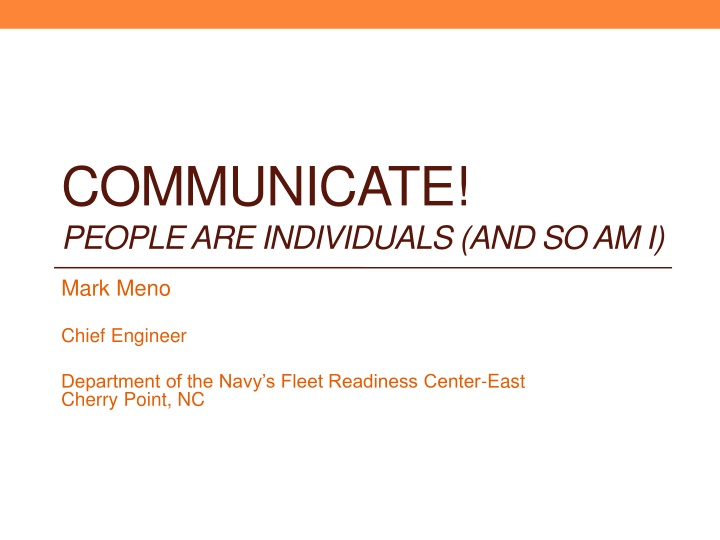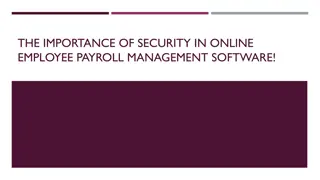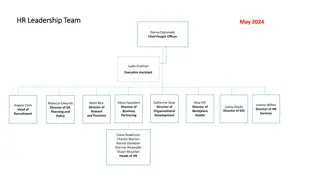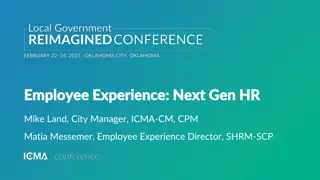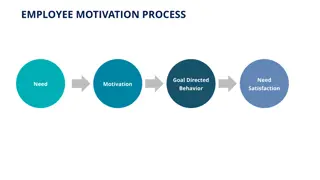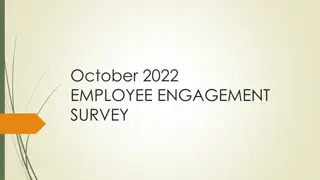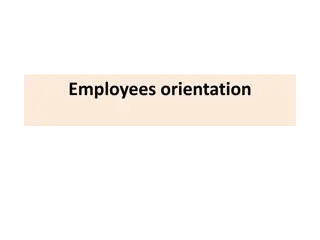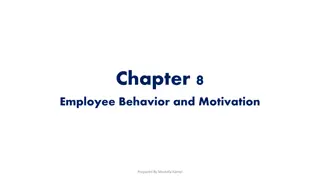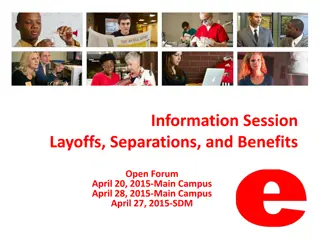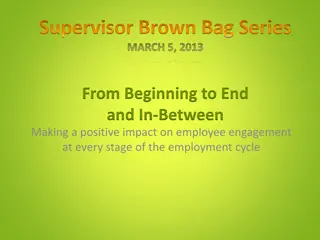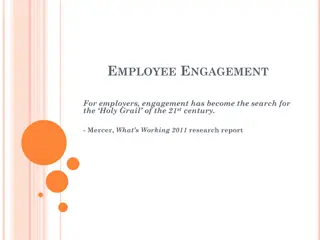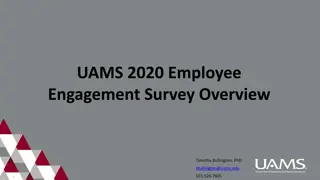Effective Communication: A Key to Employee Engagement
In this content, the importance of effective communication in fostering employee engagement is explored. Through real-life examples and insights, it emphasizes the impact of communication on organizational success and individual performance. Learn how understanding and improving communication can enhance teamwork, goal alignment, and trust within a workplace setting.
Download Presentation

Please find below an Image/Link to download the presentation.
The content on the website is provided AS IS for your information and personal use only. It may not be sold, licensed, or shared on other websites without obtaining consent from the author.If you encounter any issues during the download, it is possible that the publisher has removed the file from their server.
You are allowed to download the files provided on this website for personal or commercial use, subject to the condition that they are used lawfully. All files are the property of their respective owners.
The content on the website is provided AS IS for your information and personal use only. It may not be sold, licensed, or shared on other websites without obtaining consent from the author.
E N D
Presentation Transcript
COMMUNICATE! PEOPLE ARE INDIVIDUALS (AND SO AM I) Mark Meno Chief Engineer Department of the Navy s Fleet Readiness Center-East Cherry Point, NC
My Story Oldest Kid / One Younger Brother Multi-sport athlete / Team Captain Chemical Engineer World Class Introvert So What? Non-Verbal Communication Quiet and Shy But Directive?
What This Isnt . . . Seminar on Public Speaking Tutorial on Speech Writing Class on Effective Use of PowerPoint Exercise on Persuasive Speech What It Is . . . One Guy s Lessons Learned on Communication
Why Communicate? Not JUST about sharing information that s the easy part It should not be overlooked that communication is about: Employee ENGAGEMENT and here s why . . .
Another Way To Look At The Numbers Stephen Covey, in The 8th Habit, describes a poll of 23,000 employees drawn from a number of companies and industries. 37% have a clear understanding of what their organization is trying to achieve & why 1 in 5 was enthusiastic about their team's and their organization's goals 1 in 5 had a clear "line of sight" between their tasks and their team's and organization's goals 15% felt that their organization fully enables them to execute key goals 20% fully trusted the organization they work for If, say, a soccer team had these same numbers: Only 4 of the 11 players on the field would know which goal is theirs Only 2 of the 11 would even care Only 2 of the 11 would know what position they play and exactly what they are to do All but 2 would, in some way, be competing against their own team member instead of the opponent
What Ive Learned About Communication When It is Easy For Me, It Is Easy for a Reason, Because I m: Treating a group as a cohesive unit Attributing a mind or mindset to that whole group Using my go-to means for introvert communications When It Is Effective, It Is Usually Harder, Because I m: Identifying individual traits within the group Tailoring communication techniques to speak to a wider audience Utilizing multiple means of communication Focusing on getting inside of the communication customer s head Figuring out if the message was received
Situational and Audience Awareness Context of communication / Time and place matter A joke that would be a hit with your friends may not be appropriate at the office. Similarly, pouring your heart out to a dear friend is different from doing so with a boss or a young child. Level of formality But don t be frightened into losing your personality or what makes you a good communicator Recognize your relationship with the audience Most basic example . . . Is this adults or fellow students (boss or peer) Acknowledge differences in personality Extroverts like to communicate face-to-face, over the phone, and in large groups. They tend to think out loud. Introverts prefer to talk through emails, text messages, and in one-on-one conversations. They often need time to reflect before answering questions CONSIDER AN INFORMAL AUDIENCE ANALYSIS Age span, gender, education level, values, cultures, family structures, and even background experiences of those in your audience
Generational Generalities Baby Boomers (1946-1965) Allow the listeners/participants to share their own perspectives and experiences Prefer a democratic, non-authoritarian approach that allows them to show off what they know Small groups are favored as ways of processing information and providing more opportunity to exhibit expertise This group also does not like to be put on the spot - strategies such as role-playing are very unpopular with this group Fairness is critical, and perceptions that expectations or evaluations are not fair can be very negative for boomers Respect is given based on position. Gen X (1966-1979) A hands-off approach is key to communicating with this group Gen Xers are very visual, much more so than the boomers, and prefer to see info communicated in a visual fashion Demands speakers "know their stuff" and not likely to accept anything at face value just because "the speaker said so" Relevance is essential so if information is without apparent logic, this is a generation that will simply choose not to follow Counsel but not hover, coach but not demand, provide feedback and affirmation and allow for plenty of independence. Gen Y (1980-2000) A collaborative learning setting is valued by this group The most visual, and the most technologically savvy of the three groups Prefer a broad overview of the topics, supported by subsequent specific and detailed information This is also a group that wants to know exactly what they are expected to know and exactly what they need to master Prefer opportunities to interact do hands-on activities and projects Respect is earned based on relationships and experiences
Purposeful Words Be intentional with the language you use. Words can help you quickly connect with someone, but they may also offend them Choose words based on the age, education, and literacy level of the person(s) you are talking with Use words they understand and can connect with Use technical words only if you are communicating with people who know what they mean. If you must use jargon, take the time to explain what it means Your goal is the receipt of information, not a I m really smart demonstration
Use Your Body / Use Your Senses Adapt your nonverbal communication to the situation at hand Eye contact is generally a good way to connect with the person But, just as an example, in an extremely sensitive situation, sitting side- by-side with someone can remove the pressure of having to look someone in the eyes and thus make the other person more comfortable Personal space varies both by culture, by individual, and by relationship Significant other distance supervisor or stranger distance Pay attention to the other person's feedback Some people may offer verbal feedback by asking questions Watch the nonverbal communication (crossing their arms, looking away, nodding) to see how an audience is responding to what you re saying If they seem confused, explain it again in different words or use visuals
Communication Method(s) Each method of communication has advantages and disadvantages If you are able to choose, pick the method most effective for your audience. If you can, use more than one! It is NOT unnecessarily repetitive The more important topic, the more communication methods you should (must?) use When giving a speech, realize that you are the only one talking Anticipate questions your audience may have and communicate an answer. Open the floor to easy questions or share one to get things started When engaging in social media, you can be more relaxed but be AWARE! Email and text messaging require a conscious choice of words. Be direct. Express tone through your words. You don t have body language to convey humor
Lets Ponder . . . How would you communicate the following topics: An advanced research paper topic to a room full of parents An emotional story to your classmates, some of whom aren t friends Bullying you witnessed to a teacher or other adult Some great news to your friends some of whom will be jealous Terrible news to a group of your friends
Closing Thought The single biggest problem in communication is the illusion that it has taken place. George Bernard Shaw
Questions/Comments/Discussion Now I m REALLY confused thanks for nothing! Engineers are weird What did he say his name was? %&#! This guy was BORING! No cool videos or anything? Can I get a cheat sheet? Is it time to go yet? He s an introvert?
